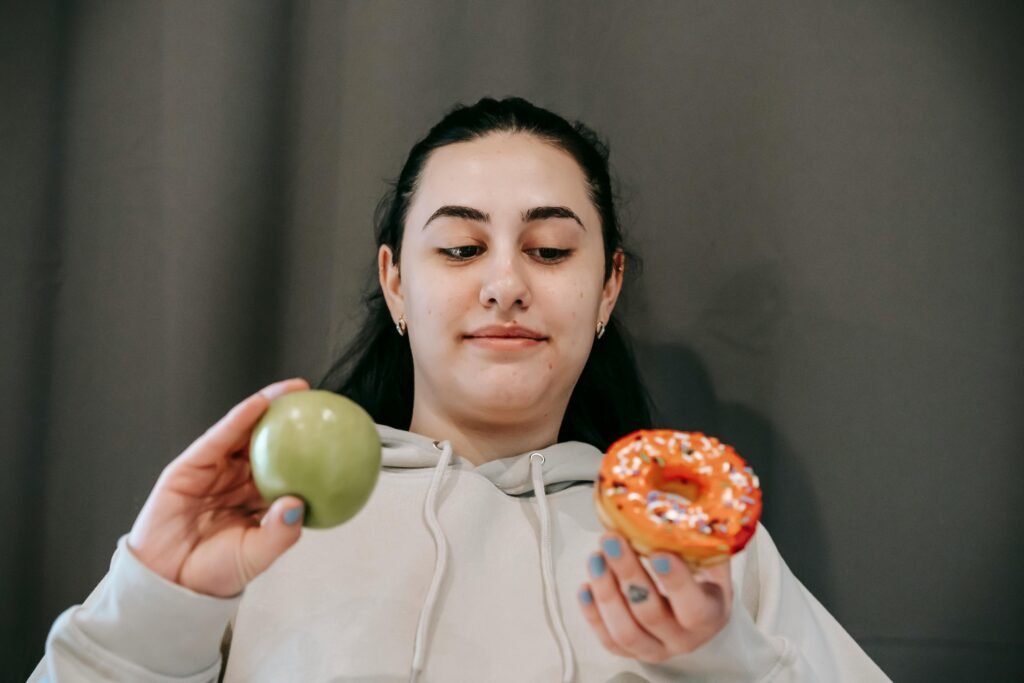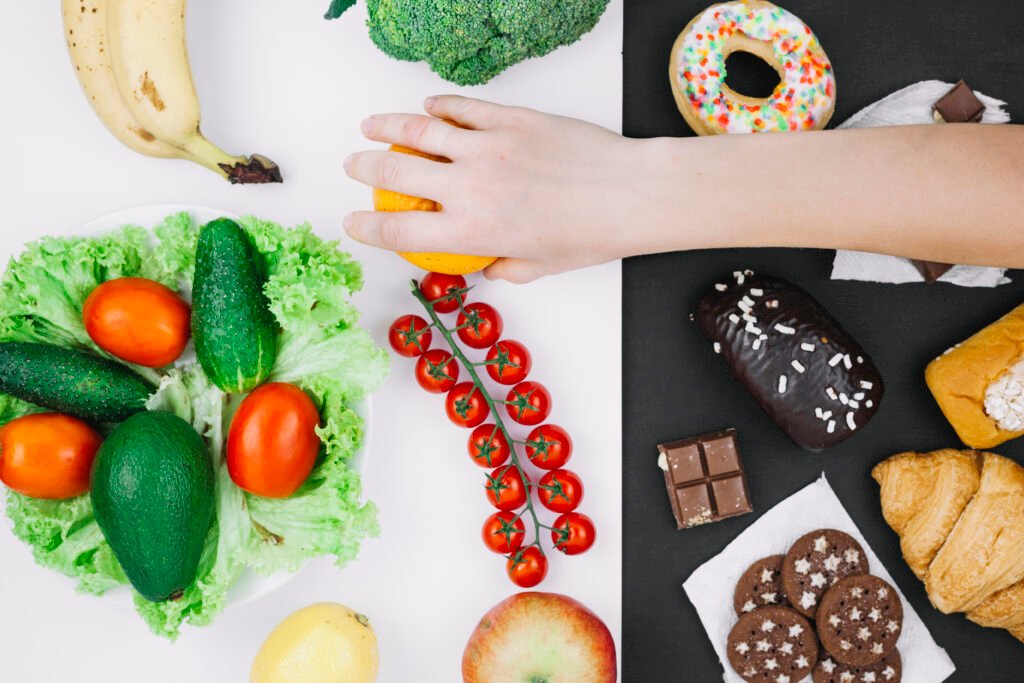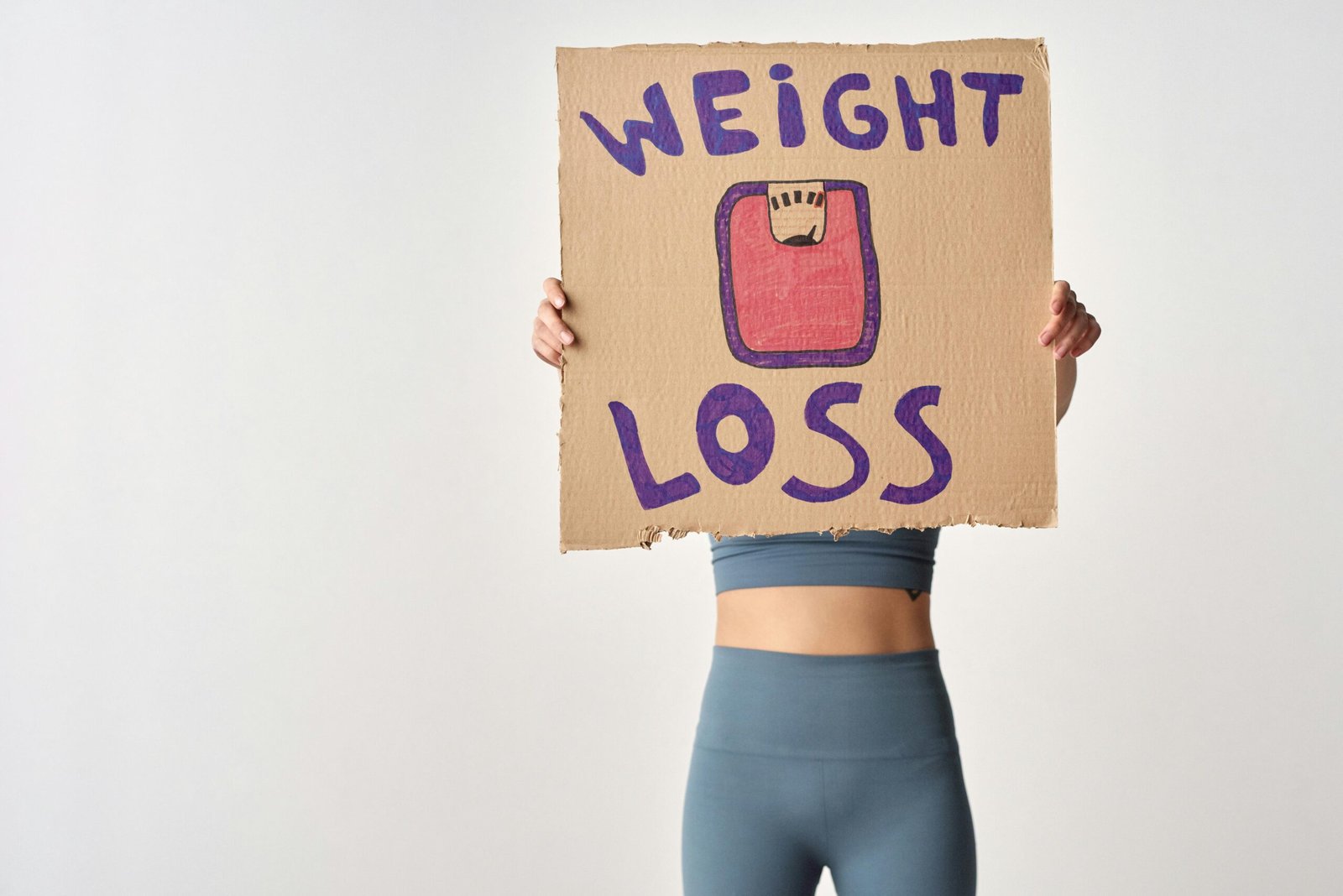Proper nutrition plays a key role in weight loss. Although exercise is important for maintaining fitness, what you eat has a greater impact on the number on the scale. Food choices affect your metabolism, hunger levels, energy, and long-term well-being, making nutrition the foundation of sustainable weight management.
Many people attempt crash diets to lose weight quickly, but such approaches are rarely effective in the long run. Restrictive diets leave you feeling deprived, and the weight often comes back as soon as old habits return. Instead, focusing on balanced, healthy nutrition ensures consistent progress without burnout or frustration.
Achieving lasting weight loss is about adopting small, practical changes to your eating patterns. When you nourish your body properly, you’ll feel more energised, reduce cravings, and develop sustainable habits that support your goals. Every healthy choice brings you one step closer to success.
How Nutrition Impacts Weight Loss
Calories In vs. Calories Out

Weight loss comes down to a simple equation: consume fewer calories than your body uses each day. This principle is known as the “calories in vs. calories out” concept. If you take in fewer calories than your body burns, you create a calorie deficit, which forces your body to use stored fat for energy. However, it’s not just about eating less; it’s also about choosing the right foods to stay satisfied while maintaining the deficit.
The Role of Macronutrient Balance
Balancing your macronutrients—proteins, carbohydrates, and fats—helps you lose weight efficiently. Protein preserves muscle mass and keeps you feeling full. Carbohydrates, especially complex carbs like whole grains, offer steady energy without spiking your blood sugar. Healthy fats, such as those from avocados and nuts, provide long-lasting satiety and prevent overeating.

Hydration and Sleep: Key Supporting Factors
Staying hydrated helps with digestion, curbs unnecessary hunger, and keeps you energised. Sometimes, your body may confuse thirst with hunger, leading to unnecessary snacking. Similarly, sleep is essential for weight loss—when you’re sleep-deprived, hunger hormones become imbalanced, increasing cravings for sugary or high-calorie foods.
What to Eat for Weight Loss
High-Protein Foods
Protein is essential for weight loss because it reduces hunger and helps preserve muscle during fat loss. Foods like eggs, lean chicken, tofu, fish, and beans are rich in protein and provide lasting energy. Including protein in every meal keeps you feeling full, preventing unnecessary snacking. Try a breakfast with eggs or yogurt, as starting the day with protein stabilises hunger levels throughout the morning.
Adding plant-based proteins like lentils, quinoa, and chickpeas can provide variety. These options are also rich in fibre, giving you double the benefit for weight loss. Aim to include a source of protein in every meal to maintain steady energy and muscle health.
Fibre-Rich Foods
Fibre helps regulate your digestion and keeps you full between meals, reducing cravings. Vegetables like broccoli, leafy greens, carrots, and fruits such as apples and berries are excellent choices. Whole grains, including oats, brown rice, and whole-wheat bread, add bulk to your diet and stabilise blood sugar levels, preventing the post-meal crash that often leads to overeating.
Including fibre-rich foods can also reduce bloating and improve gut health. Make small swaps, like using whole-wheat pasta instead of white, or adding more vegetables to your plate. Eating a fibre-rich salad before your main meal is another smart way to fill up while reducing calorie intake.
Healthy Fats
Healthy fats are essential for curbing hunger and supporting brain function. Foods like avocados, olive oil, nuts, and seeds provide long-lasting satiety, helping you avoid mindless snacking. They also promote heart health, which is important during weight loss.
Incorporate small portions of healthy fats into your meals—drizzle olive oil over salads or add avocado slices to toast. However, watch your portion sizes, as fats are calorie-dense. A handful of almonds or a tablespoon of peanut butter makes for a healthy snack without overloading on calories.
Low-Calorie Snacks
Choosing the right snacks helps you avoid derailment. Instead of reaching for crisps or sweets, opt for popcorn, fresh berries, or yogurt. These snacks are satisfying without adding too many calories. Greek yogurt topped with fruit or a boiled egg makes a great snack to control hunger between meals.
You can also prepare small portions of vegetables like carrot sticks or cucumber slices for quick snacks. These options keep your energy levels steady and prevent you from overindulging at your next meal.
What to Avoid for Effective Weight Loss

Sugary Drinks and Snacks
Sugary drinks like soda and fruit juices contain empty calories that offer no nutritional value. They spike your blood sugar and lead to crashes, which often cause cravings. Cutting back on these drinks and switching to water, herbal teas, or sparkling water can significantly reduce your calorie intake.
Similarly, sweets like candy, cakes, and biscuits can slow your progress. Instead of completely cutting them out, enjoy these treats in moderation or replace them with healthier alternatives, like fresh fruit or dark chocolate.
Processed Foods
Fast food, frozen meals, and packaged snacks are often high in unhealthy fats, sugar, and salt. These foods are designed to be convenient but can make it harder to maintain weight loss. Instead of processed options, focus on cooking simple, whole foods at home. Preparing meals with lean proteins, vegetables, and whole grains ensures better control over your nutrition.
Refined Carbohydrates
White bread, pasta, and pastries provide little fibre or nutrients and cause rapid blood sugar spikes, followed by energy crashes. These fluctuations make it harder to manage hunger and cravings. Swapping refined carbs for whole-grain alternatives, like whole-wheat bread or quinoa, will keep your blood sugar stable and help you feel satisfied for longer.
Alcohol
Alcohol adds empty calories to your diet and disrupts metabolism. It can also increase appetite and reduce your ability to make healthy food choices. If you’re trying to lose weight, reducing alcohol consumption or opting for lighter drinks, like sparkling water with lime, can support your goals.
Tips to Build Lasting Healthy Eating Habits
Meal Planning and Preparation
Meal planning saves time and ensures that you have nutritious meals ready when hunger strikes. Plan your meals at the start of the week and prepare ingredients in advance. Batch-cook dishes like grilled chicken, roasted vegetables, or soups to keep your fridge stocked with healthy options.
Having prepared meals reduces the temptation to order takeout when you’re busy. You’ll find it easier to stay on track when you know exactly what you’ll eat for each meal.
Mindful Eating
Mindful eating encourages you to focus on your food and recognise when you’re truly hungry or full. Take time to savour your meals without distractions, such as watching TV or scrolling on your phone. This helps prevent overeating and builds a healthy relationship with food.
Using smaller plates and paying attention to portion sizes also supports mindful eating. When you eat slowly, you give your body time to signal when it’s satisfied, reducing the risk of overeating.
Stay Consistent
The key to lasting weight loss is consistency. Instead of making drastic changes, focus on small, sustainable habits. Start by swapping sugary drinks for water, adding more vegetables to your meals, or including a source of protein in every dish. These small steps will build over time and become part of your lifestyle.
It’s okay to indulge occasionally—balance is the goal, not perfection. What matters most is maintaining consistent progress toward healthier eating patterns.
Track Progress
Tracking your meals, weight, and habits helps you stay accountable. Use a food diary or an app to record what you eat and monitor how your body responds. Tracking also helps you identify patterns, such as emotional eating, and areas where you can improve.
Celebrate small victories along the way. Whether it’s resisting a snack or cooking a healthy meal, recognising these achievements keeps you motivated and focused on your goals.
Conclusion
Weight loss through nutrition is about making smart, sustainable choices rather than following restrictive diets. Focus on incorporating high-protein foods, fibre-rich vegetables, and healthy fats into your meals while avoiding sugary snacks, processed foods, and refined carbs.
By planning meals, practising mindful eating, and staying consistent, you can develop healthy habits that last a lifetime. Tracking your progress ensures you remain on the right path, and celebrating small achievements keeps you motivated.
Every small change matters. Each healthy decision brings you closer to your weight loss goals, helping you build a lifestyle that supports long-term wellness. Focus on progress, not perfection, and enjoy the journey toward a healthier you.





